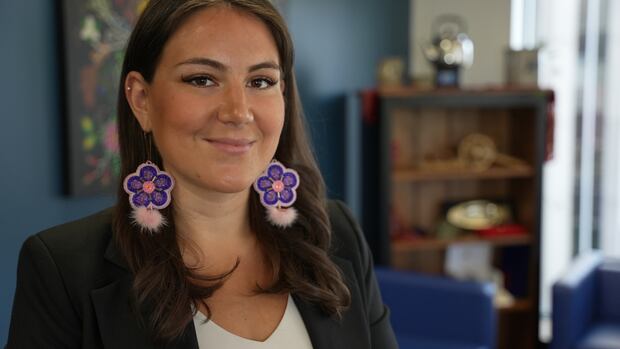Some Métis leaders deny president's statement that self-interest is fuelling political disunity
MMF’s Goodon says collective desire to protect Red River Métis identity led Manitoba to exit MNC

Some Métis leaders are rejecting the outgoing Métis National Council (MNC) president's statement that their national unity is being divided by the self-interest, impatience and ambitions of a few.
Cassidy Caron made the comment this week in a statement addressing the Métis Nation—Saskatchewan's decision to leave the national organization, following the Manitoba Métis Federation's exit in 2021.
While she didn't name anyone, Caron said "some leaders have forgotten about our greater responsibility to each other and to nationhood."
Will Goodon, MMF minister of housing, saw Caron's comments as a swipe at Manitoba and Saskatchewan leadership.
In parting ways with the MNC, the two groups cited concerns that the Métis Nation of Ontario (MNO) continues to represent people who aren't Métis. Goodon believes the withdrawals protect rather than divide the nation.
Thousands of delegates, representing the collective will of the federation's Red River Métis citizens, authorized MMF to pull out over the long-simmering identity dispute with Ontario, Goodon countered.
"It's not because of self-interest. The self-interest is what's happening in Ontario to keep those fake communities," he said in an interview. "We left because the MNC had become a place for identity fraud and identity theft to be moved forward at a massive scale."
MNO denies that its communities are fake or engaged in identity theft, often citing the Supreme Court of Canada's 2003 recognition of a Métis community in Sault Ste. Marie, Ont.
MNO and the Ontario government jointly recognized six more communities as "historic" in 2017. Goodon argued it's the council's support for MNO's communities that causes division.
"That's what's caused the splinter," he said. "Manitoba and Saskatchewan, literally the heart and the soul of the historic Métis Nation, have left because the Métis National Council is a reckless, feckless, dysfunctional organization."
Métis Nation—Saskatchewan President Glen McCallum, when asked for a response to Caron's statement, said, "I could easily get angry, but I'm not."
His group is focused on building a government, delivering results and doing what's best collectively for Métis people in his province, McCallum said in an interview.
"I would never make a decision based on my personal interest," he said. "I represent 80,000 [people] in the province of Saskatchewan. Over 30,000 are registered. Those are the citizens I represent, not myself."

In a follow-up statement to CBC Indigenous on Friday, Caron said she worked to transform the national council into a credible, respected and transparent organization despite facing misogyny and ageism every step of the way, like other women leaders in Canada.
The outgoing president said she is proud of that work but recognizes transforming a 40-year-old organization takes time.
"Despite the pushback from those who would prefer to keep the status quo, I remain undeterred and stand proudly with the strong, diverse voices of all generations of Métis that are needed at all levels of leadership," she added.
Questions about the future
For his part, McCallum wouldn't speculate on the council's future, saying Saskatchewan made its decision so he's focused on the job before him.
"What everybody else does is their business. Our business now is focusing on our treaty," he said.
Goodon on the other hand was blunt about his view of the council.
"It's dead — silver bullet shot through its heart," he said. "There's no doubt that it can't exist."
The organization was formed in 1983 when three Métis associations in Manitoba, Saskatchewan and Alberta split from the Native Council of Canada, which also included non-status First Nations.
Goodon argued the organization now can't credibly claim to represent Métis people on any level, national or otherwise, without two of its three founders.
In an exit interview with CBC News on Thursday, Caron said she is personally confident the organization can survive without those critical voices, expressing optimism about the future.
"We are an organization that's existed for 41 years, and it's always going to need to transform," said Caron, who isn't running for re-election when her term ends next week.
There remains a great need for one strong Métis National Council voice at the national and international level, she added.
"And if there ever comes a day that the Manitoba Métis Federation or the Métis Nation—Saskatchewan want to return to the Métis National Council, at least we are here for them to return to."
Caron said the organization has ways to continue, despite a bylaw that requires the presence of two of its three founding members to hold a meeting. She said she presented the remaining board members with a strong plan to move forward.
Asked to elaborate, she said a committee was working on bylaw reforms that would need to be ratified at the council's general assembly, which was scheduled for this month but postponed until no later than Nov. 14.


